形容词及形容词词组
- 格式:doc
- 大小:106.00 KB
- 文档页数:17

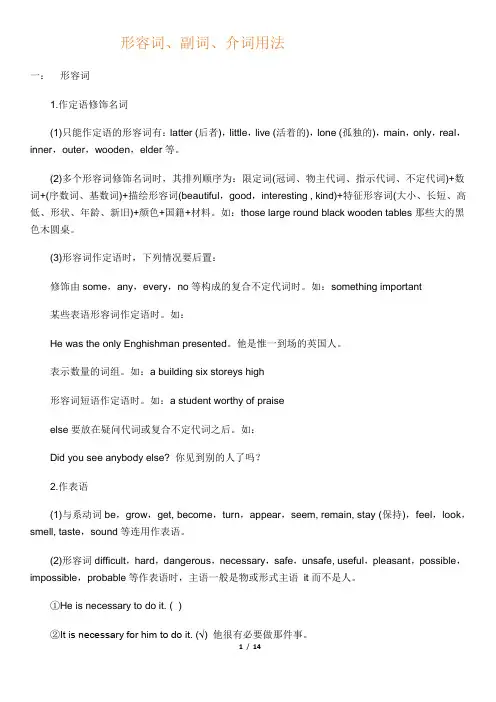
形容词、副词、介词用法一:形容词1.作定语修饰名词(1)只能作定语的形容词有:latter (后者),little,live (活着的),lone (孤独的),main,only,real,inner,outer,wooden,elder等。
(2)多个形容词修饰名词时,其排列顺序为:限定词(冠词、物主代词、指示代词、不定代词)+数词+(序数词、基数词)+描绘形容词(beautiful,good,interesting , kind)+特征形容词(大小、长短、高低、形状、年龄、新旧)+颜色+国籍+材料。
如:those large round black wooden tables那些大的黑色木圆桌。
(3)形容词作定语时,下列情况要后置:修饰由some,any,every,no等构成的复合不定代词时。
如:something important某些表语形容词作定语时。
如:He was the only Enghishman presented。
他是惟一到场的英国人。
表示数量的词组。
如:a building six storeys high形容词短语作定语时。
如:a student worthy of praiseelse要放在疑问代词或复合不定代词之后。
如:Did you see anybody else? 你见到别的人了吗?2.作表语(1)与系动词be,grow,get, become,turn,appear,seem, remain, stay (保持),feel,loo k,smell, taste,sound等连用作表语。
(2)形容词difficult,hard,dangerous,necessary,safe,unsafe, useful,pleasant,possible,impossible,probable等作表语时,主语一般是物或形式主语it而不是人。
①He is necessary to do it. (×)②It is necessary for him to do it. (√) 他很有必要做那件事。
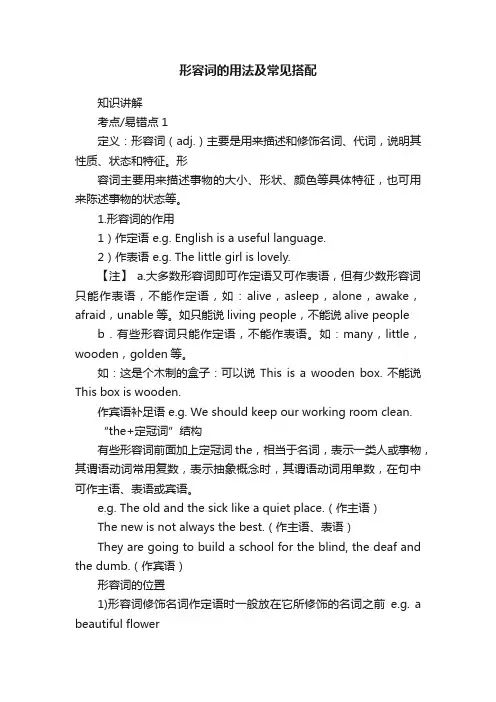
形容词的用法及常见搭配知识讲解考点/易错点1定义:形容词(adj.)主要是用来描述和修饰名词、代词,说明其性质、状态和特征。
形容词主要用来描述事物的大小、形状、颜色等具体特征,也可用来陈述事物的状态等。
1.形容词的作用1)作定语 e.g. English is a useful language.2)作表语 e.g. The little girl is lovely.【注】a.大多数形容词即可作定语又可作表语,但有少数形容词只能作表语,不能作定语,如:alive,asleep,alone,awake,afraid,unable等。
如只能说living people,不能说alive people b.有些形容词只能作定语,不能作表语。
如:many,little,wooden,golden等。
如:这是个木制的盒子:可以说This is a wooden box. 不能说This box is wooden.作宾语补足语 e.g. We should keep our working room clean.“the+定冠词”结构有些形容词前面加上定冠词the,相当于名词,表示一类人或事物,其谓语动词常用复数,表示抽象概念时,其谓语动词用单数,在句中可作主语、表语或宾语。
e.g. The old and the sick like a quiet place.(作主语)The new is not always the best.(作主语、表语)They are going to build a school for the blind, the deaf and the dumb.(作宾语)形容词的位置1)形容词修饰名词作定语时一般放在它所修饰的名词之前e.g. a beautiful flower与不定代词something,anything,everything,nothing等连用时,须放在这些词的后面e.g. It’s nothing serious.2)与表示度量的词连用,形容词要放在它所修饰词语的后面e.g. He can swim across a river 200 meters wide.3)由and或or所连接的两个形容词通常放在被修饰的名词之后,其强调修饰作用e.g. Everyone, young or old, has his own strong point and weak point.4)有两个或两个以上的形容词修饰同一个名词时,形容词排列的一般顺序a.音节较短的形容词放在音节较长的形容词前 e.g. a rainy, windy and unpleasant dayb.与被修饰名词关系较密切的形容词靠近该名词e.g. a great modern socialist country一个伟大的现代化社会主义国家c.当冠词、代词、形容词、名词和分词同时修饰一个名词时,句子中的各种形容词的位置要由它们和被修饰名词的关系密切程度而定。
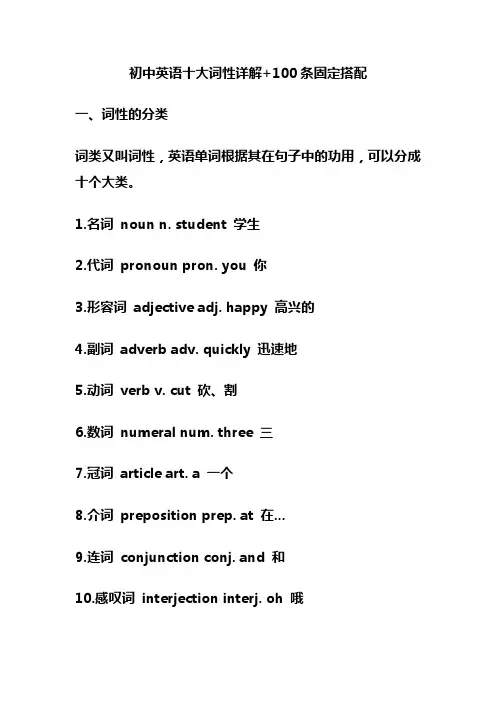
初中英语十大词性详解+100条固定搭配一、词性的分类词类又叫词性,英语单词根据其在句子中的功用,可以分成十个大类。
1.名词noun n. student 学生2.代词pronoun pron. you 你3.形容词adjective adj. happy 高兴的4.副词adverb adv. quickly 迅速地5.动词verb v. cut 砍、割6.数词numeral num. three 三7.冠词article art. a 一个8.介词preposition prep. at 在...9.连词conjunction conj. and 和10.感叹词interjection interj. oh 哦前六类叫实词,后四类叫虚词。
二、名词名词复数的规则变化名词的格在英语中有些名词可以加“‘s ”来表示所有关系,带这种词尾的名词形式称为该名词的所有格,如:a teacher ’s book 。
名词所有格的规则如下:(1)单数名词词尾加“'s”,复数名词词尾没有s,也要加“'s”,如the boy‘s bag 男孩的书包,men’s room 男厕所。
(2)若名词已有复数词尾-s ,只加“'”,如:the workers’struggle工人的斗争。
三、代词大多数代词具有名词和形容词的功能。
英语中的代词,按其意义、特征及在句中的作用分为:人称代词、物主代词、指示代词、反身代词、相互代词、疑问代词、关系代词、连接代词和不定代词九种。
人称代词的用法:指示代词指示代词分单数(this / that)和复数(these / those)两种形式,既可作限定词又可做代词。
疑问代词指人:who,whom,whose指物:what既可指人又可指物:which四、冠词冠词是位于名词或名词词组之前或之后,在句子里主要是对名词起限定作用的词。
冠词是一种虚词。
不定冠词a (an)与数词one 同源,是“一个”的意思。
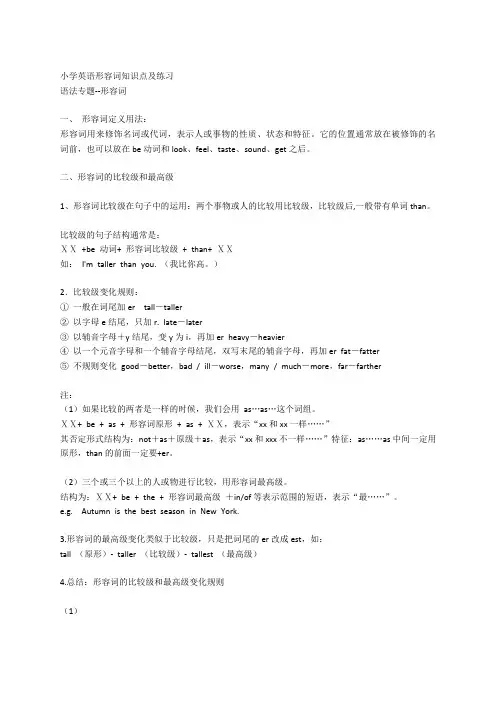
小学英语形容词知识点及练习语法专题--形容词一、形容词定义用法:形容词用来修饰名词或代词,表示人或事物的性质、状态和特征。
它的位置通常放在被修饰的名词前,也可以放在be动词和look、feel、taste、sound、get之后。
二、形容词的比较级和最高级1、形容词比较级在句子中的运用:两个事物或人的比较用比较级,比较级后,一般带有单词than。
比较级的句子结构通常是:ⅩⅩ+be 动词+ 形容词比较级+ than+ ⅩⅩ如:I'm taller than you. (我比你高。
)2.比较级变化规则:①一般在词尾加er tall-taller②以字母e结尾,只加r. late-later③以辅音字母+y结尾,变y为i,再加er heavy-heavier④以一个元音字母和一个辅音字母结尾,双写末尾的辅音字母,再加er fat-fatter⑤不规则变化good-better,bad / ill-worse,many / much-more,far-farther注:(1)如果比较的两者是一样的时候,我们会用as…as…这个词组。
ⅩⅩ+ be + as + 形容词原形+ as + ⅩⅩ,表示“xx和xx一样……”其否定形式结构为:not+as+原级+as,表示“xx和xxx不一样……”特征:as……as中间一定用原形,than的前面一定要+er。
(2)三个或三个以上的人或物进行比较,用形容词最高级。
结构为:ⅩⅩ+ be + the + 形容词最高级+in/of等表示范围的短语,表示“最……”。
e.g. Autumn is the best season in New York.3.形容词的最高级变化类似于比较级,只是把词尾的er改成est,如:tall (原形)- taller (比较级)- tallest (最高级)4.总结:形容词的比较级和最高级变化规则(1)构成原级比较级最高级单音节和少数双音节单词一般词尾加-er, -esttalllongoldsmalltallerlongeroldersmallertallestlongestoldestsmallest以字母e结尾的形容词或副词,直接加-r,-stnicefinelargenicerfinerlargernicestfinestlargest以重读闭音节结尾的形容词或副词,如末尾只有一个辅音字母,双写该字母,再加-er,-est bighotfatthinbiggerhotterfatterthinnerbiggesthottestfattestthinnest以“辅音字母+y”结尾的形容词或副词,把y变为i,再加-er,-estheavybusyearlyeasyheavierbusierearliereasierheaviestbusiestearliesteasiest(2)部分双音节与多音节的词比较级在原级之前加more, 最高级在原级之前加most beautiful---more beautiful---most beautifulinteresting---difficult---(3)不规则变化的形容词:little / few(原形)- less (比较级)- least(最高级)good(原形)- better(比较级)- best(最高级)bad (原形)- worse(比较级)- worst(最高级)far (原形)-- further—furthest专题练习及答案Ⅰ.写出以下各形容词的比较级和最高级:1. nice ____________2. fat __________3. slow ____________4. dry _________5. happy ___________6. wet _________7. much ____________ 8. little _________9. bad ______________10. thin _________11. far _____________ 12. early ________Ⅱ.根据句意,用所括号内所级形容词的比较等级形式填空:1. Mr. Smith is _________ man in this office. (rich)2. Winter is _________ season of the years. (cold)3. It is much _______ today than yesterday. (hot)4. She is a little ________ than her classmates. (careful)5. Which book is ________, this one or that one? (easy)6. My room is _______ than yours. (small)7. Skating is _______ than swimming. (exciting)8. Jim is _______ than all the others. (honest)9. The higher you climb, the _______ it will be. (cold)10. Now his life is becoming ________ and _______. (difficult)参考答案Ⅰ略Ⅱ.1. the richest2.the coldest3.hotter4.more careful5. easier6.smaller7.more exciting8.more honest9. colder10more and more difficult。
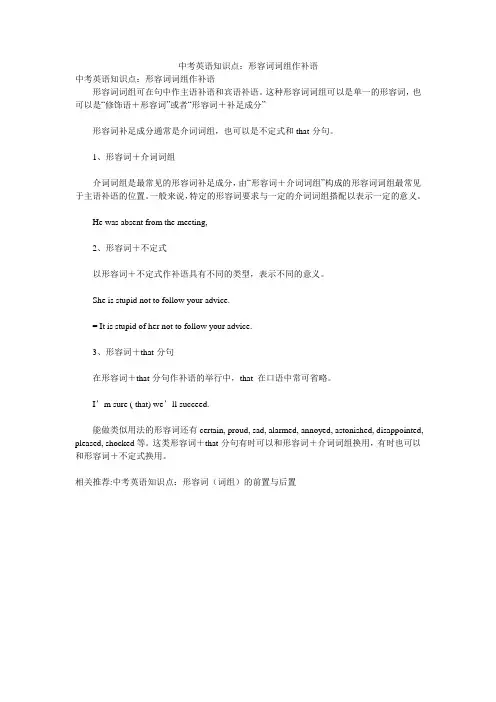
中考英语知识点:形容词词组作补语
中考英语知识点:形容词词组作补语
形容词词组可在句中作主语补语和宾语补语。
这种形容词词组可以是单一的形容词,也可以是“修饰语+形容词”或者“形容词+补足成分”
形容词补足成分通常是介词词组,也可以是不定式和that-分句。
1、形容词+介词词组
介词词组是最常见的形容词补足成分,由“形容词+介词词组”构成的形容词词组最常见于主语补语的位置。
一般来说,特定的形容词要求与一定的介词词组搭配以表示一定的意义。
He was absent from the meeting,
2、形容词+不定式
以形容词+不定式作补语具有不同的类型,表示不同的意义。
She is stupid not to follow your advice.
= It is stupid of her not to follow your advice.
3、形容词+that-分句
在形容词+that-分句作补语的举行中,that 在口语中常可省略。
I’m sure ( that) we’ll succeed.
能做类似用法的形容词还有certain, proud, sad, alarmed, annoyed, astonished, disappointed, pleased, shocked等。
这类形容词+that-分句有时可以和形容词+介词词组换用,有时也可以和形容词+不定式换用。
相关推荐:中考英语知识点:形容词(词组)的前置与后置。
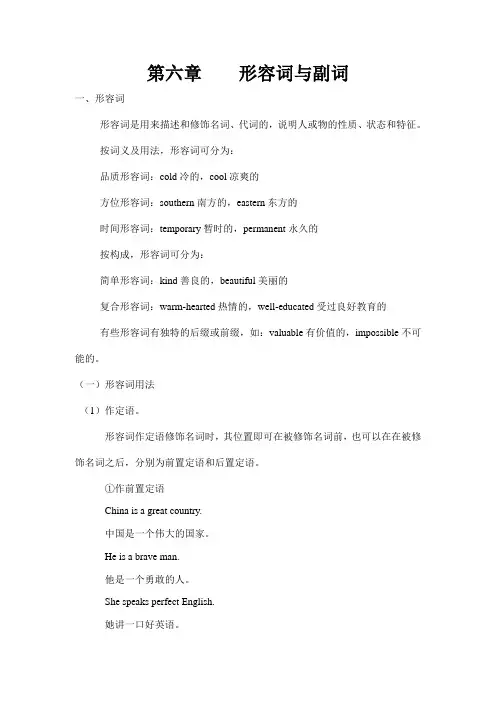
第六章形容词与副词一、形容词形容词是用来描述和修饰名词、代词的,说明人或物的性质、状态和特征。
按词义及用法,形容词可分为:品质形容词:cold冷的,cool凉爽的方位形容词:southern南方的,eastern东方的时间形容词:temporary暂时的,permanent永久的按构成,形容词可分为:简单形容词:kind善良的,beautiful美丽的复合形容词:warm-hearted热情的,well-educated受过良好教育的有些形容词有独特的后缀或前缀,如:valuable有价值的,impossible不可能的。
(一)形容词用法(1)作定语。
形容词作定语修饰名词时,其位置即可在被修饰名词前,也可以在在被修饰名词之后,分别为前置定语和后置定语。
①作前置定语China is a great country.中国是一个伟大的国家。
He is a brave man.他是一个勇敢的人。
She speaks perfect English.她讲一口好英语。
②作后置定语a)形容词再修饰something,everything,anything,nothing,someone,everyone,anyone,somebody,everybody,anybody,nobody,somewhere,anywhere。
nowhere。
等补丁代词时,应置于被修饰词之后。
如:He did everything possible to help us.他尽一切可能来帮我们。
He has something important to tell you.他有重要的事要告诉你。
Anyone drunk is not allowed to drive.任何醉酒的人都不许开车。
b)形容词带有短语作状语是,应一起置于被修饰词之后,常见的有:difficult,easy,different,the same,similar,next,last,first等。
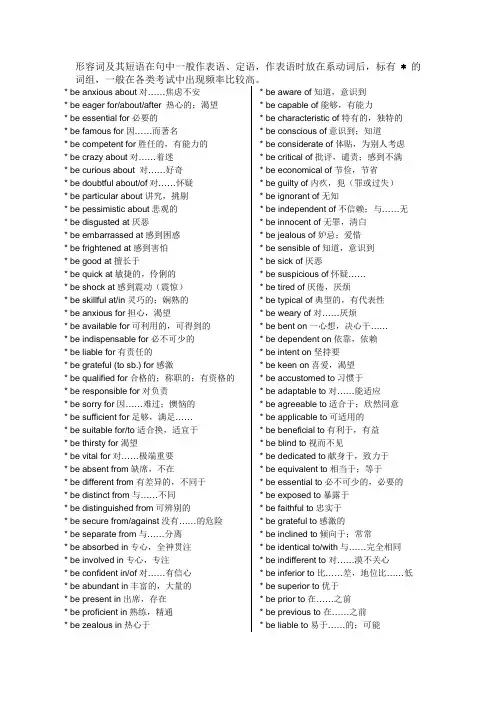
形容词及其短语在句中一般作表语、定语,作表语时放在系动词后,标有 *的词组,一般在各类考试中出现频率比较高。
* be anxious about对……焦虑不安* be eager for/about/after 热心的;渴望* be essential for必要的* be famous for因……而著名* be competent for胜任的,有能力的* be crazy about对……着迷* be curious about 对……好奇* be doubtful about/of对……怀疑* be particular about讲究,挑剔* be pessimistic about悲观的* be disgusted at厌恶* be embarrassed at感到困惑* be frightened at感到害怕* be good at擅长于* be quick at敏捷的,伶俐的* be shock at感到震动(震惊)* be skillful at/in灵巧的;娴熟的* be anxious for担心,渴望* be available for可利用的,可得到的* be indispensable for必不可少的* be liable for有责任的* be grateful (to sb.) for感激* be qualified for合格的;称职的;有资格的* be responsible for对负责* be sorry for因……难过;懊恼的* be sufficient for足够,满足……* be suitable for/to适合换,适宜于* be thirsty for渴望* be vital for对……极端重要* be absent from缺席,不在* be different from有差异的,不同于* be distinct from与……不同* be distinguished from可辨别的* be secure from/against没有……的危险* be separate from与……分离* be absorbed in专心,全神贯注* be involved in专心,专注* be confident in/of对……有信心* be abundant in丰富的,大量的* be present in出席,存在* be proficient in熟练,精通* be zealous in热心于* be aware of知道,意识到* be capable of能够,有能力* be characteristic of特有的,独特的* be conscious of意识到;知道* be considerate of体贴,为别人考虑* be critical of批评,谴责;感到不满* be economical of节俭,节省* be guilty of内疚,犯(罪或过失)* be ignorant of无知* be independent of不信赖;与……无* be innocent of无罪,清白* be jealous of妒忌;爱惜* be sensible of知道,意识到* be sick of厌恶* be suspicious of怀疑……* be tired of厌倦,厌烦* be typical of典型的,有代表性* be weary of对……厌烦* be bent on一心想,决心干……* be dependent on依靠,依赖* be intent on坚持要* be keen on喜爱,渴望* be accustomed to习惯于* be adaptable to对……能适应* be agreeable to适合于;欣然同意* be applicable to可适用的* be beneficial to有利于,有益* be blind to视而不见* be dedicated to献身于,致力于* be equivalent to相当于;等于* be essential to必不可少的,必要的* be exposed to暴露于* be faithful to忠实于* be grateful to感激的* be inclined to倾向于;常常* be identical to/with与……完全相同* be indifferent to对……漠不关心* be inferior to比……差,地位比……低* be superior to优于* be prior to在……之前* be previous to在……之前* be liable to易于……的;可能* be loyal to忠诚于* be new to不熟悉,没有经验* be obliged to感激* be parallel to与……平行* be peculiar to……所特有的* be polite to有礼貌的* be preferable to更好的,更可取的* be resistant to有抵抗力的;耐……的* be relevant to与……有关* be sensitive to对……敏感* be subject to易于……的* be acquainted with认识某人,了解某物* be busy with忙于* be comparable with可比较;比得上* be compatible with与……和谐共处;符合* be confronted with面临……* be consistent with与……一致;始终如一* be content with对……满足* be correspondent with与……相符* be faced with面临* be familiar with对……熟悉* be fed up with讨厌* be generous with/in大方,慷慨* be patient with有耐心* be popular with流行;为……所喜爱* be strict with sb.对某人严格* be wrong with不正常;有毛病be angry about 因……生气be careful about小心;注意be certain about有把握,确定be concerned about担心;关心be pleased about为……而高兴be sick about对……忧心忡忡(伤心)be sorry about后悔;惋惜be worried about担心,发愁be amazed at感到惊讶be angry at对某事发怒be annoyed at ……烦恼be astonished at感到惊讶be bad at不善于be clever at擅长be crazy about/on对……着迷,热衷be delighted at因……很高兴be mad at对……恼火be pleased at对……欣慰be poor at不擅长的,羞的be slow at慢的,迟钝的be surprised at感到惊异be terrible at因……吓了一跳be adequate for足够的,恰当的be appropriate for作为……是恰当的be bad for不利的be bound for/to(车船)开往;(人)到……去be crazy for渴望be fit for对……合适be good for有益于be greedy for贪婪;渴望be impatient for急于要得到be necessary for必需的be perfect for完美的;极好的be ready for为……准备好be remarkable for显著的;值得注意的be ripe for成熟的be scheduled for列入时间表的be spread for摆开,铺开be watchful for警惕be diverse from和……不一样be divorced from与……离婚;脱离be far frocm远离;决不be free from免受……的be isolated from隔离的,孤立的be remote from远离be removed from远离的;疏远的be safe from安全的be high in丰富的be rich in丰富的be plentiful in丰富的be accurate in准确的,精确的be deficient in缺少be interested in对……感兴趣be prompt in立即的,迅速的be punctual in准时的;按时的be qualified in胜任,合适be strict in sth.对某事严格be strong in擅长于be weak in薄弱的be afraid of害怕be ashamed of为……惭愧,害臊be born of出身于be careful of要仔细,小心be careless of漫不经心的be cautious of小心谨慎的be certain of确信,有把握be clear of清除了,摆脱了be doubtful of对……怀疑be empty of没有东西be envious of妒忌,羡慕be fearful of害怕,担心be fond of喜爱be free of免除;没有be frightened of害怕be full of充满be hopeful of怀有希望be impatient of不能忍受的be nervous of紧张,害怕be possessed of拥有,占有be proud of感到骄傲(自豪)be representative of代表be scared of害怕be short of缺乏……be shy of对……迟疑;有戒心be sure of确信;对……有把握be terrified of受惊吓be thoughtful of深思;(常)想到be thoughtless of不考虑be true of对……适用;符合于be uncertain of/about/as to对……不确定be based on以……为基础be efficient on效率高,有能力be hard on严厉be heavy on对……严厉,严格be revenged on向……报复,报仇be rough on对人粗暴苛刻be accurate to准确,精确be advantageous to对……有利be close to靠近;几乎be common to共同的be comparable to比得上的;可比的be contrary to与……相反be convenient to对……方便be cruel to残酷的be devoted to专心致力于;忠诚be engaged to与……定婚be entitled to给……权力(或资格)be equal to等于be familiar to对……熟悉be fatal to致命的;具有毁灭性的be foreign to陌生,不熟悉be fundamental to必要的be gentle to温柔的be harmful to有害的be helpful to有帮助的be junior to年幼于be senior to年长于be anterior to先于be posterior to(时间上)后于be kind to和蔼;友好be married to和……结婚be necessary to必要的be open to开放的be opposite to相反的;对立的be related to与……有关系be relative to和……相应,和……有关be responsible to sb. for sth.对……负责be rude to粗鲁的;无礼貌的be similar to与……类似,相似be strange to感到生疏be suitable to适合be valuable to有价值的be angry with对某人生气be bored with对……厌烦be concerned with与……有关;关心be consumed with被……吞食be delighted with对……感到高兴be filled with充满be frank with坦率be friendly with与……友好be satisfied with对……感到满意be scattered with散布,分布be seized with(疾病)侵袭be severe with严厉;苛刻be stern with严厉;严格be thrifty with节省,节俭,简朴。
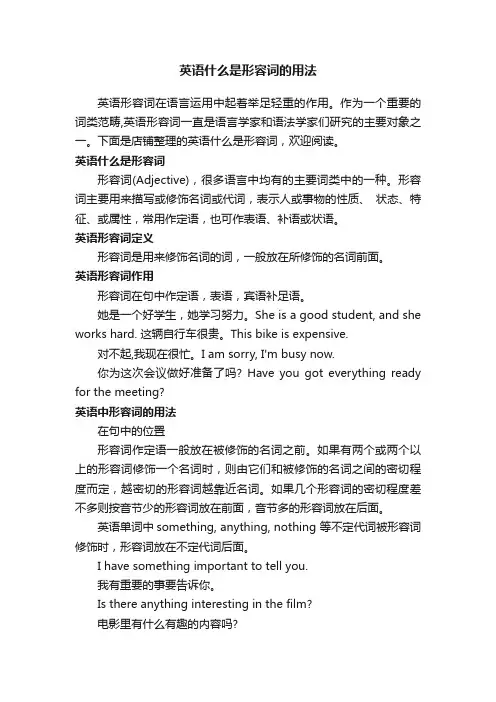
英语什么是形容词的用法英语形容词在语言运用中起着举足轻重的作用。
作为一个重要的词类范畴,英语形容词一直是语言学家和语法学家们研究的主要对象之一。
下面是店铺整理的英语什么是形容词,欢迎阅读。
英语什么是形容词形容词(Adjective),很多语言中均有的主要词类中的一种。
形容词主要用来描写或修饰名词或代词,表示人或事物的性质、状态、特征、或属性,常用作定语,也可作表语、补语或状语。
英语形容词定义形容词是用来修饰名词的词,一般放在所修饰的名词前面。
英语形容词作用形容词在句中作定语,表语,宾语补足语。
她是一个好学生,她学习努力。
She is a good student, and she works hard. 这辆自行车很贵。
This bike is expensive.对不起,我现在很忙。
I am sorry, I'm busy now.你为这次会议做好准备了吗? Have you got everything ready for the meeting?英语中形容词的用法在句中的位置形容词作定语一般放在被修饰的名词之前。
如果有两个或两个以上的形容词修饰一个名词时,则由它们和被修饰的名词之间的密切程度而定,越密切的形容词越靠近名词。
如果几个形容词的密切程度差不多则按音节少的形容词放在前面,音节多的形容词放在后面。
英语单词中something, anything, nothing 等不定代词被形容词修饰时,形容词放在不定代词后面。
I have something important to tell you.我有重要的事要告诉你。
Is there anything interesting in the film?电影里有什么有趣的内容吗?There is nothing dangerous here.这儿一点都不危险。
由两个或两个以上的词组成的形容词词组修饰名词时须放在名词之后。
This is the book easy to read.这是一本容易读的书。
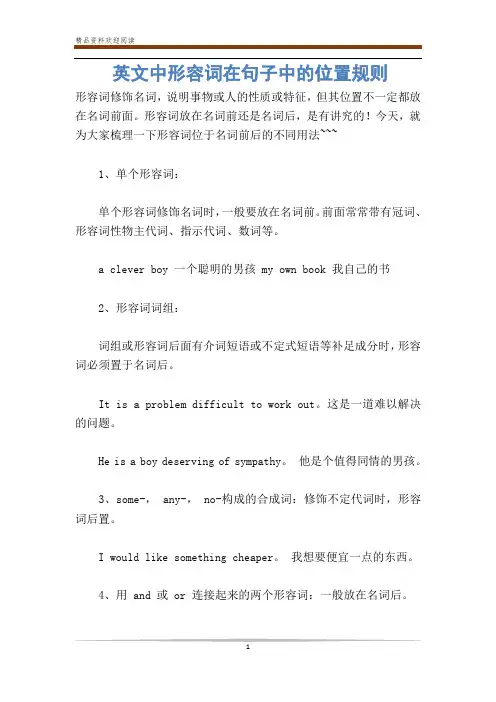
英文中形容词在句子中的位置规则形容词修饰名词,说明事物或人的性质或特征,但其位置不一定都放在名词前面。
形容词放在名词前还是名词后,是有讲究的!今天,就为大家梳理一下形容词位于名词前后的不同用法~~~1、单个形容词:单个形容词修饰名词时,一般要放在名词前。
前面常常带有冠词、形容词性物主代词、指示代词、数词等。
a clever boy 一个聪明的男孩 my own book 我自己的书2、形容词词组:词组或形容词后面有介词短语或不定式短语等补足成分时,形容词必须置于名词后。
It is a problem difficult to work out。
这是一道难以解决的问题。
He is a boy deserving of sympathy。
他是个值得同情的男孩。
3、some-, any-, no-构成的合成词:修饰不定代词时,形容词后置。
I would like something cheaper。
我想要便宜一点的东西。
4、用 and 或 or 连接起来的两个形容词:一般放在名词后。
All people, young or old, should obey the law。
所有的人,无论老少,都应该守法。
5、有些形容词:置于名词之前与之后,含义不同。
the writer present 出席的作者 the person responsible 负责的人the present writer 现在的作者 a responsible person 可信赖的人6、只能后置的形容词:有些形容词与某些名词搭配时,可前可后,但与另外一些名词搭配时,只能有一个位置。
the involved/ concerned/ interested party= the party involved/ concerned/ interested但只能说 the people involved/ concerned/ interested7、同一层次的形容词:位于名词前,逗号隔开,较长词最后。
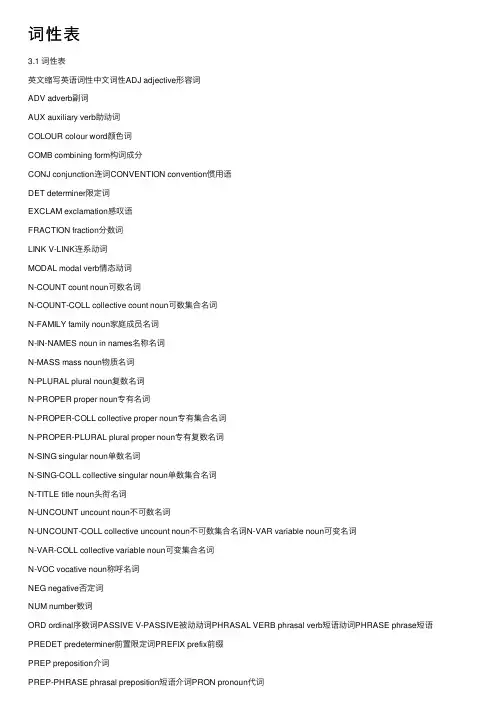
词性表3.1 词性表英⽂缩写英语词性中⽂词性ADJ adjective形容词ADV adverb副词AUX auxiliary verb助动词COLOUR colour word颜⾊词COMB combining form构词成分CONJ conjunction连词CONVENTION convention惯⽤语DET determiner限定词EXCLAM exclamation感叹语FRACTION fraction分数词LINK V-LINK连系动词MODAL modal verb情态动词N-COUNT count noun可数名词N-COUNT-COLL collective count noun可数集合名词N-FAMILY family noun家庭成员名词N-IN-NAMES noun in names名称名词N-MASS mass noun物质名词N-PLURAL plural noun复数名词N-PROPER proper noun专有名词N-PROPER-COLL collective proper noun专有集合名词N-PROPER-PLURAL plural proper noun专有复数名词N-SING singular noun单数名词N-SING-COLL collective singular noun单数集合名词N-TITLE title noun头衔名词N-UNCOUNT uncount noun不可数名词N-UNCOUNT-COLL collective uncount noun不可数集合名词N-VAR variable noun可变名词N-VAR-COLL collective variable noun可变集合名词N-VOC vocative noun称呼名词NEG negative否定词NUM number数词ORD ordinal序数词PASSIVE V-PASSIVE被动动词PHRASAL VERB phrasal verb短语动词PHRASE phrase短语PREDET predeterminer前置限定词PREFIX prefix前缀PREP preposition介词PREP-PHRASE phrasal preposition短语介词PRON pronoun代词QUANT quantifier数量词QUANT-PLURAL plural quantifier复数数量词QUEST question word疑问词RECIP V-RECIP相互动词SOUND sound word声⾳词SUFFIX suffix后缀VERB verb动词V-LINK link verb连系动词V-PASSIVE passive verb被动动词V-RECIP reciprocal verb相互动词V-RECIP-PASSIVE passive reciprocal verb被动相互动词3.2 语法信息—缩略语英⽂缩写英语词性中⽂词性adj adjective group形容词词组adj-compar comparative form形容词⽐较级形式adj-superl superlative form形容词最⾼级形式adv adverb group副词词组amount word or phrase indicating an amount of something数量词或数量短语as if clause beginning with as if or as though 以 as if 或 as though开头的从句或分句brd-neg broad negative⼴义否定结构cl clause从句或分句colour colour word颜⾊词compar comparative form⽐较级形式cont continuous进⾏时态def-n definite noun group限定性名词词组def-n-uncount definite noun group with an uncount noun 含不可数名词的限定性名词词组def-pl-n definite noun group with a noun in the plural含复数名词的限定性名词词组det determiner限定词det-poss possessive determiner所有格限定词-ed past participle of a verb动词过去分词group noun group, adjective, adverb, or prepositionalphrase名词词组、形容词、副词或介词短语imper imperative祈使inf infinitive form of a verb动词不定式-ing present participle of a verb动词现在分词it‘introductory’ or ‘dummy’it 起引导作⽤或虚指的 it like clause beginning with like以 like 开头的从句n noun or noun group名词或名词词组n (not pron)noun group, but not a personal pronoun名词词组(不包括⼈称代词)names names of places or institutions地⽅或机构名称neg negative word否定词non-recip verb pattern with no reciprocal meaning⽆相互意义的动词结构n-proper proper noun专有名词num number数词n-uncount uncount noun or noun group with an uncount noun 不可数名词或含不可数名词的名词词组oft often经常ord ordinal序数词P particle, part of a phrasal verb⼩品词,短语动词的⼀部分passive passive voice被动语态pl plural复数pl-n noun in the plural, plural noun group,co-ordinated noun group复数名词、复数名词词组或并列名词词组pl-num plural number复数数词poss possessive所有格prep prepositional phrase or preposition介词短语或介词pron pronoun代词pron-indef indefinite pronoun不定代词pron-recip reciprocal pronoun相互代词pron-refl reflexive pronoun反⾝代词pron-rel relative pronoun关系代词quest question word疑问词quote direct speech直接引语sing singular单数sing-n noun in the singular单数名词supp supplementary information accompanying a noun名词补语that‘that’-clause that引导的从句to-inf the to-infinitive form of a verb带 to 的动词不定式usu usually通常v verb or verb group动词或动词词组v-cont continuous verb延续性动词V-ed past participle of the verb动词过去分词V-ing present participle of the verb动词现在分词v-link link verb连系动词way way preceded by a possessive determiner前带所有格限定词的 waywh wh-word, clause beginning with a wh-word 特殊疑问词或由此类词引导的从句。
形容词、副词形容词:说明人或事物的特征、性质或状态,常用来修饰名词或代词的词。
通常形容词分为性质形容词和叙述形容词两大类。
性质形容词直接说明事物的性质、特征。
有等级变化,可以用程度副词修饰。
可以作主语、定语、表语和宾补。
形容词大部分是性质形容词。
叙述形容词用来说明事物的关系、用途、时间、方位(different/ southern/ Chinese)等。
没有等级变化,不能用程度副词修饰,一般只作表语。
也称为表语形容词。
eg. afraid/ alone/ awake/ asleep/ alive/ alike/ ashamed/ afloat/ well(健康的)/ ill/ sorry(难过的)/ sure/ worth一.形容词的用法。
1.作定语,放在名词之前,代词之后。
This handsome man is a French teacher.I have something important to tell you.2. 作表语,放在系动词之后。
(系动词become/ fall/ turn/ grow/ keep/ remain/ stay/ look/ smell/ taste/ sound)He looks very happy.This kind of cloth feels soft.3. 作宾补,放在宾语之后,常与make, leave, keep等动词连用。
You must keep your eyes closed before you see the gifts.4. 作状语,表示伴随或结果,不表示动作的方式。
He returned home, safe and sound.The man is standing there, full of fear.The unicorn rolled over, dead.5.表语形容词(eg. afraid/ alone/ awake/ asleep/ alive/ alike/ ashamed/ afloat/ well/ sorry/ sure/ worth)除了作表语,还能作补足语,后置定语(一般不做前置定语)。
英语语法什么是形容词性短语形容词性短语(Adjectival Phrase)是一种由形容词或相当于形容词的词组构成的短语,用来修饰名词或代词,在句子中充当形容词的角色。
形容词性短语可以提供更多的描述和信息,使句子更加具体和生动。
下面我将详细介绍形容词性短语的种类、结构和用法。
形容词性短语的种类:1. 单个形容词:形容词本身可以作为一个形容词性短语,用来修饰名词或代词。
例如:a beautiful flower(一朵美丽的花)。
2. 形容词短语:由一个或多个形容词组成的短语,用来修饰名词或代词。
例如:a tall, handsome man(一个高大、英俊的男人)。
3. 名词+ 形容词结构:由一个名词和一个形容词构成的短语,用来修饰名词或代词。
例如:a city park(城市公园)。
4. 介词短语:由介词和一个名词或代词构成的短语,用来修饰名词或代词。
例如:a book on the table(桌子上的书)。
5. 不定式短语:由动词不定式和一个名词或代词构成的短语,用来修饰名词或代词。
例如:a person to trust(一个值得信任的人)。
形容词性短语的结构:形容词性短语的结构可以是简单的形容词,也可以是包含其他词类的短语。
其中,形容词性短语可以由以下成分构成:1. 形容词:例如:happy, tall, beautiful。
2. 副词:例如:very, quite, extremely。
3. 名词:例如:a city, the sky, my friend。
4. 介词:例如:on the table, in the park, with a smile。
5. 不定式:例如:to learn, to explore, to see。
6. 从句:例如:that is interesting, who is kind。
形容词性短语的用法:形容词性短语通常用于修饰名词或代词,起到描述和限定的作用。
英语十类词性分类及用法-最全讲解一、词性的分类词类又叫词性,英语单词根据其在句子中的功用,可以分成十个大类。
1.名词noun n. student 学生2.代词pronoun pron. you 你3.形容词adjective adj. happy 高兴的4.副词adverb adv. quickly 迅速地5.动词verb v. cut 砍、割6.数词numeral num. three 三7.冠词article art. a 一个8.介词preposition prep. at 在...9.连词conjunction conj. and 和10.感叹词interjection interj. oh 哦前六类叫实词,后四类叫虚词。
下面就一一介绍二、名词名词复数的规则变化名词的格在英语中有些名词可以加“‘s”来表示所有关系,带这种词尾的名词形式称为该名词的所有格,如:a teacher’s book。
名词所有格的规则如下:1)单数名词词尾加“'s”,复数名词词尾没有s,也要加“'s”,如the boy‘s bag 男孩的书包,men’s room 男厕所。
2)若名词已有复数词尾-s ,只加“'”,如:the workers’struggle工人的斗争。
三、代词大多数代词具有名词和形容词的功能。
英语中的代词,按其意义、特征及在句中的作用分为:人称代词、物主代词、指示代词、反身代词、相互代词、疑问代词、关系代词、连接代词和不定代词九种人称代词的用法I saw her with them,at least, I thought it was her.我看到她和他们在一起,至少我认为是她。
(her做宾语,them做介词宾语,her作主补)a. -- Who broke the vase?--谁打碎了花瓶?b. -- Me.--我。
并列人称代词的排列顺序1) 单数人称代词并列作主语时,其顺序为:如:You, he and I should return on time.2) 复数人称代词作主语时,其顺序为:反身代词指示代词指示代词分单数(this / that)和复数(these / those)两种形式,既可作限定词又可做代词疑问代词指人:who,whom,whose指物:what既可指人又可指物:which四、冠词冠词是位于名词或名词词组之前或之后,在句子里主要是对名词起限定作用的词。
clever中文意思以及词组短语整理clever中文意思以及词组短语clever,英语单词,形容词,意思是“聪慧的;机智的;娴熟的”。
下面跟着我来看看clever中文意思以及词组短语吧!期望对你有所帮忙。
clever中文意思以及词组短语1英[klev(r)]美[klevr]adj.聪慧的;灵活的副词: cleverly比较级: cleverer最高级: cleverest名词: clevernessClever Cat 聪慧一猫第1页/共6页Box Clever 聪慧方块; 蓝色水球; 精明clever fingers 灵活的手指Clever hands 灵活的双手; 伶俐的双手Clever Enterprising 明智进取的Clever Rabbits 聪慧的`兔子Clever Blocks 积木之谜; 方块积木谜题Clever Advertising 创意街头广告over clever 聪慧累bright,clever,wise,brilliant,intelligent,ingenious,smart,shrewd这些形容词均含有“聪慧的”之意。
bright口语常用词,多指年轻人,尤指小孩思路灵敏,理解力强,机智等。
clever强调头脑敏捷,接受新事物快,有智有谋,但不肯定示意全面妥当地考虑问题。
wise侧重不是一般的聪慧伶俐,而是有远见,有才智,能明智地处理问题。
第2页/共6页brilliant指人的才华出众,思路灵敏,常令人赞美不已。
intelligent正式用词,指在理解新的、抽象东西或处理解决问题时,智力超过一般常人。
ingenious指思路灵敏,并示意有制造与创造的才能和技巧。
smart一般用词,与bright和clever的意思很相近,但更强调机智。
shrewd指精明老练,有头脑,擅长推断,把握有利机会。
用作形容词(adj.)Its a clever speech, but there was no real meat in it.这演说很悦耳,可是没什么内容。
英语词性的分类及用法一、词性的分类词类又叫词性,英语单词根据其在句子中的功用,可以分成十个大类。
1 名词noun n. student 学生2 代词pronoun pron. you 你3 形容词adjective adj. happy 高兴的4 副词adverb adv. quickly 迅速地5 动词verb v. cut 砍、割6 数词numeral num. three 三7 冠词article art. a 一个8 介词preposition prep. at 在...9 连词conjunction conj. and 和10 感叹词interjection interj. oh 哦前六类叫实词,后四类叫虚词。
二、名词名词概论名词复数的规则变化名词的格在英语中有些名词可以加"'s"来表示所有关系,带这种词尾的名词形式称为该名词的所有格,如:a teacher's book。
名词所有格的规则如下:1)单数名词词尾加"'s",复数名词词尾没有s,也要加"'s",如the boy's bag 男孩的书包,men's room 男厕所。
2)若名词已有复数词尾-s ,只加"'",如:the workers' struggle工人的斗争。
3)凡不能加"'s"的名词,都可以用"名词+of +名词"的结构来表示所有关系,如:the title of the song 歌的名字。
4)在表示店铺或教堂的名字或某人的家时,名词所有格的后面常常不出现它所修饰的名词,如:the barber's 理发店。
5)如果两个名词并列,并且分别有's,则表示"分别有";只有一个's,则表示'共有'。
初中英语的十大词性分类及其用法英语语法最基础的就是词性了!因为后续的各种时态变化、从句很多的考点都是结合词性才产生的!要想学好语法,那就一定要打牢词性这个基础!一、词性的分类词类又叫词性,英语单词根据其在句子中的功用,可以分成十个大类。
1.名词noun n. student 学生2.代词pronoun pron. you 你3.形容词adjective adj. happy 高兴的4.副词adverb adv. quickly 迅速地5.动词verb v. cut 砍、割6.数词numeral num. three 三7.冠词article art. a 一个8.介词preposition prep. at 在...9.连词conjunction conj. and 和10.感叹词interjection interj. oh 哦前六类叫实词,后四类叫虚词。
二、名词名词复数的规则变化名词的所有格在英语中有些名词可以加“‘s”来表示所有关系,带这种词尾的名词形式称为该名词的所有格,如:a teacher’s book。
名词所有格的规则如下:1)单数名词词尾加“'s”,复数名词词尾没有s,也要加“'s”,如the boy‘s bag 男孩的书包,men’s room 男厕所。
2)若名词已有复数词尾-s ,只加“'”,如:the workers’ struggle工人的斗争。
三、代词大多数代词具有名词和形容词的功能。
英语中的代词,按其意义、特征及在句中的作用分为:人称代词、物主代词、指示代词、反身代词、相互代词、疑问代词、关系代词、连接代词和不定代词九种人称代词的用法:I saw her with them,at least,I thought it was her.我看到她和他们在一起,至少我认为是她。
(her做宾语,them做介词宾语,her作主补)a. -- Who broke the vase?--谁打碎了花瓶?b. -- Me.--我。
形容词及形容词词组 教学目的:了解形容词的分类;掌握形容词的用法及功能 教学重点:形容词的用法 教学难点:形容词的位置 学时数: 一、形容词分类 形容词是一种开放词类,在句中主要作修饰成分。形容词主要分为单词形容词,等级形容词和非等级形容词。 1.依词的构成划分:单词形容词(One-word Adjective)和复合形容词(Compound Adjective) 由一个自由词素构成,如:boy, kind 1)单词形容词 自由词素+前(后)缀构成,如:boyish, unkind
adj.+adj. red-hot 炽热的;dark-green深绿色的 adj./adv.+-ing easy-going随和的;good-looking好看的 adj./adv.+-ed new-born新生的;ready-cooked烧好的 2)复合形容词 n.+adj. sea-sick晕船的;ice-cold冰冷的 n.+-ing man-eating吃人的;epoch-making划时代的 n.+-ed heart-broken伤心的;ice-covered结冰的 adj.+n.+-ed gray-haired白发的;one-eyed独眼的 2. 依句法功能划分:中心形容词(Central Adjective)和外围形容词(Peripheral Adjective) 1)中心形容词:既能作名词修饰语又能作主补和宾补的形容词 e.g. Green apples are sour (作名词修饰语) Pillar-boxes are green. (作主语补语) They have painted the windows green. (作宾语补足语) 2)外围形容词:只能作修饰语或者只能作补语的形容词。如,utter只能作修饰语不能作补语: This is utter nonsense. (√) The nonsense is utter. (×) 又如asleep只能作补语不能作修饰语: This child is asleep. (√) This is an asleep child. (×) 3. 依词汇意义划分:动态形容词(Dynamic Adjective)和静态形容词(Stative Adjective) 1) 静态形容词:描写人或物的静态特征,如,tall, short, small, big, beautiful, ugly等,大多数形容词都是静态形容词。 2)动态形容词:含有动作含义,如,clever, cheerful, dull, gentle, generous, helpful, patient, witty, etc. 3) 动态形容词和静态形容词的特征对比: a) 动态形容词可与动be的进行体搭配作补语,而静态形容词则不可以。 e.g. She is being witty. (√) She is being tall. (×) b) 动态形容词可用于由动词be开始的祈使句,而静态形容词则不可以。 e.g. Be patient! (√) Be pretty. (×) c) 动态形容词可用于使役结构(Caustative Construction),而静态形容词则不可以。 e.g. I persuaded her to be generous. (√) I persuaded her to be pretty. (×) 二、形容词的功能 1. 作定语 形容词作定语一般修饰名词,形容词通常前置,但有时也可后置,如: It was a rainy day. Someone else has done it. 1) 前置定语 当名词中心词前出现几个属于不同层次的形容词作修饰语时,常常涉及词序问题,排列顺序大致如下: (1)可以置于冠词前的形容词:all, both, such等; (2)冠词、指示代词、所有格形容词、不定形容词:a, an, the, this, those, your, his, our, any, some等; (3)序数词:first, second, third等; (4)基数词:one, two, three等;表示 (5)性质、状态、质量的形容词:nice, good, sweet, useful等; (6)表示大小、长短、形状的形容词:big, small, square, round 等; (7)表示年龄、新旧、温度的形容词:young, new, old, cold, hot等; (8)表示颜色的形容词:blue, white, brown等; (9)表示国籍、产地、区域的形容词:Chinese, American等; (10)表示材料、用作形容词的名词:iron, oil, stone, silk等; (11)分词:floating, handmade等 (口诀:all等代冠数前置,描大形新颜国材) e.g. a large antique brown and white German beer-mug 译:一只德国古代棕白两色的大啤酒杯 a weak small spare old man 一个瘦弱的小老头 a well-known German medical school 一所著名的德国医学院 an interesting little red French oil painting一幅有趣的小型法国油画 his first two interesting little red French oil paintings 他的前两幅有趣的小型法国油画 Ex. Radio, television and press_______ of conveying news as information.
A) are the most three common means B) are the most three common means C) are the three most common means D) are three the most common means 2)后置定语 形容词作定语一般位于所修饰的名词前,但是在下列情况下作定语的形容词却要位于所修饰的名词之后: a) 形容词短语作定语时要后置。如: I think he is a man suitable for the job. 我认为他是适合做这项工作的人。 We need a place twice larger than this one. 我们需要一个比这里大一倍的地方。 b) 表语形容词作定语要后置。如: He spoke like a man afraid. 他说话时像是很害怕似的。 He must be the best violinist alive. 他一定是当代最好的小提琴手了。 c) 受修饰复合不定代词时后置。如: Tell me something interesting. 给我说些有意思的事。 Anyone intelligent can do it. 任何有头脑的人都能做这件事。 2. 作补语 形容词作主语补足语和宾语补足语时,可以表示其现状、状态,也可以表示某一动作的结果(如knock sb. Senseless), 并常用在表示“认为,看待”的动词如believe, prove, consider 等后。例如: The news made her very sad. (宾语补足语) He died young. (主语补足语) The bottle was found empty. (主语补足语) The facts proved his accusation groundless.(宾语补足语) 3. 作状语 形容词(短语)可作状语,其位置可以是举手、句中和句末;形容词作状语时,可以看作是“being+形容词”结构或when、if、because等从句的省略,表示时间、方式、原因、伴随、让步、强调、条件等,或对主语进行解释,说明主语是什么一种情况;或进行强调。例如: Ripe, the oranges will sell at a good price.(时间)
Alice tiptoed to the bed, careful not to wake the baby.(方式) Eager to see the sunrise, they got up at four.(原因)
Breathless, she rushed in through the back door.(伴随情况)
Large or small, all countries are equal.(让步)
John is big and busy.(强调,=very busy) 4. 作表语 形容词一般用在系动词be后作表语,如: The bird’s song is very sweet. 在下列三类系动词或感官动词后,要用形容词作表语,不可用副词。 1)表示“是、在”的动词要求用形容词作表语 remain, keep持续在,continue继续在,stay保持,stand,lie位于等。 He remained silent at the meeting. 2)表示“变成,成为”的动词要求用形容词作表语 grow, turn, get变成,run很快变成,come果然变成,等。 Her dream has come true.(不可用truly) 3)感觉、感官动词要求用形容词作表语 see, appear, look, sound, smell, taste, feel等。 It sounds nicely. (×) It sounds nice. (√) He looked angrily at him. (×) He looked angry. (√) 5. 作主语 1)形容词可以用作主语,往往成对使用,具有名词化的特点。 Old and young joined in the discussion. Rich or poor meant the same to him. Careful and careless are as different as fire and water.